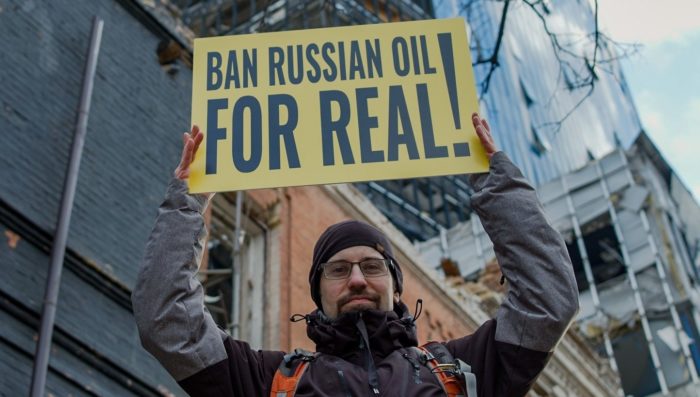The geopolitical landscape is now more than ever under the control of natural gas. The G7 Hiroshima Summit, which took place from May 19th to 21st, has only further confirmed that the worldwide addiction to fossil gas is the most challenging to eradicate on a global scale.
Prime Minister Kishida selected Hiroshima as the Summit's location due to his belief that Hiroshima best represents Japan's commitment to peace. The public heard plenty of praise for President Zelenskyy from the G7 and some enhanced commitments to support Ukraine.
However, the reality remains that many were disappointed with the reduction in the G7's final commitments. The G7 has yet to fully endorse a transparent and enforceable embargo on Russian fossil fuel exports. Such an embargo is absolutely necessary to cut off funding for Putin's war machine, bring genuine peace to Ukraine and areas far beyond its borders, and finally allow Ukraine to rebuild with safe and clean energy.
When the G7 President and the Japanese Prime Minister himself urge us to pay attention to their words on Ukraine, peace, and climate change, we must critically assess what the G7 has done in response to these interconnected issues.
The G7 claims to spearhead energy security and shift our world away from its trajectory towards an economically destructive fossil-fuel-driven climate disaster, and towards peace in Ukraine. However, the facts often contradict the politicians' words.
Over the past year, I have frequently felt uneasy when those G7 leaders have pledged hundreds of millions in aid to Ukraine, but with the other hand, continue to buy Russian fossil fuels zealously, or let others do so.
Is this global policy, global diplomacy, or solving the energy and climate crisis? We just call it hypocrisy.
The G7 leaders have once again chosen the wrong path, a fabricated world where fossil fuel addiction is merely business as usual for big, "old," and politically secure fossil fuel money. What's worse is that these leaders do not merely make bad choices for themselves; they make their decisions for the entire country and nations.
These poor decisions include, but are not limited to, the G7's hesitation to support a comprehensive embargo on Russian fossil fuel exports and their failure to clearly back Ukraine's renewable energy sector. This was highlighted in the limited progress in reducing LNG usage and promoting clean energy initiatives.
G7's commitments to new gas investments wrongly emphasized the significance of LNG in addressing energy crises and potential supply shortfalls.
These decisions were broadly criticized for obstructing the transition to clean energy and failing to meet the demands at hand.
There is ample evidence globally that new fossil gas and LNG infrastructure won't solve the current energy crisis and will significantly delay a fair transition, including Ukraine’s post-war green rebuilding:
- It is harmful to the climate;
- It will trap us in more fossil fuel infrastructure for decades;
- It will continue to generate soaring profits for the fossil fuel industry to purchase more social licenses on gas as they just did, selling us the narrative that the only way to build energy security is to explore more gas and oil.
According to all rational economic analyses, if the G7 wants energy security, it must terminate these subsidies.
The IEA estimated that consumption subsidies for fossil fuels doubled in 2022 to $1 trillion globally. This makes no economic sense for any nation, as renewables became the cheapest energy source in 2022.
Furthermore, governments and the G7 must safeguard their economies now by promptly endorsing a transition to clean energy. As the Wall Street Journal reported, insufficient action on climate change could cost the global economy $178 trillion over the next 50 years.
To be fair, Japan has stripped Russia of its "most-favored-nation" trade status
, which is a good start. However, Japan is still purchasing fossil fuels from Russia.
I find it appalling that after a year of war in Ukraine, this remains a problem.
There is no reason for any government or the G7 to continue relying on imports of Russian fossil fuels, or to spend money on them. By ending consumption of Russian fossil fuels, we eliminate the funds for Russia's military and start resolving the climate crisis to prevent more wars fueled by fossil fuels.
G7 nations must cease relying on outdated and costly gas and coal power generation that depends on fuel supplies, particularly from Russia. Instead, they should invest in now cheaper renewable energy to emerge as clean energy leaders.
Here are key demands for follow-up after the G7 Summit that the G7 nations must immediately act on. These revolve around the need for them to lead in implementing a full, transparent, and enforced embargo of Russian fossil fuels:
- All G7 nations must immediately halt their participation in joint ventures with Russia, especially in Arctic LNG-2 and Sakhalin-2 LNG projects, as they compromise Japan and the G7's commitments to protect peace and climate. This includes an immediate cessation of imports of all Russian fossil fuels, including LNG and oil, and the termination of all business operations in Russia by Japanese companies.
- The G7 should invest in renewable energy infrastructure and equipment for distributed energy resources as emergency aid for Ukraine. This is for the restoration of Ukraine's energy sector, following the principles of decentralization and a fair transition. This approach avoids investments in new fossil fuel infrastructure and halts the expansion of climate-disrupting gas projects.
- G7 nations must lead the transition towards clean energy by investing in cheaper and cleaner renewable energy globally. They should uphold the commitments made under the Glasgow Statement on International Public Support for the Clean Energy Transition, issued at COP26. This involves shifting public finance away from gas and coal to clean energy.
It is imperative that the G7 lead the world towards a climate-friendly clean energy future. This future should eliminate fossil fuel wars and conflicts, benefit people and the Earth, ensure our energy security, and promote long-term economic development.
Don’t offer us sporadic silver linings in the dark; give us peace and a true victory over fossil fuels and their profiteers.
Related:
- Windfall tax on oil and gas industry: a perfect way to fund Ukraine’s reconstruction
- Why Russia is still making money on energy sales and how to change this
- Putin’s aggression is the last call to end global fossil fuel addiction – opinion
- Five reasons why the US and the EU should impose a full embargo on Russian fossil fuels
- Germany’s largest crude oil and natural gas producer to leave Russia






